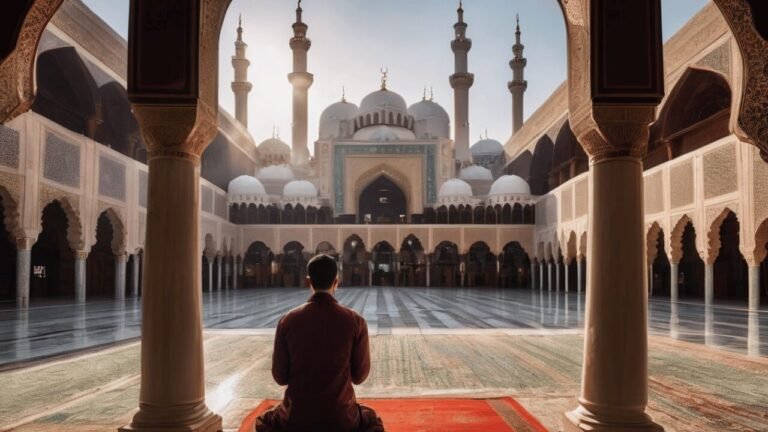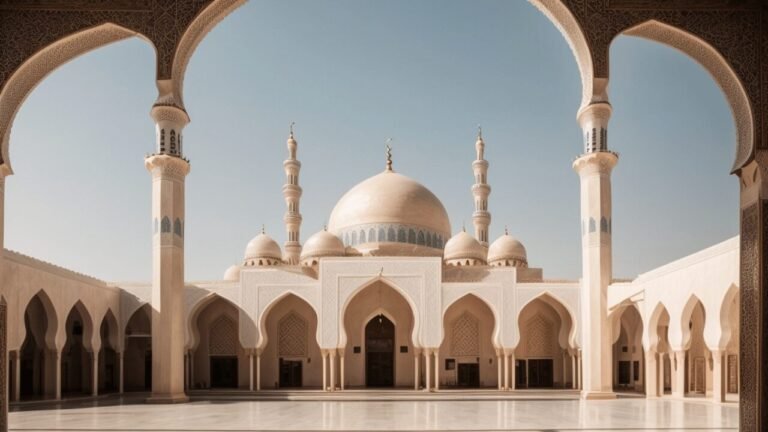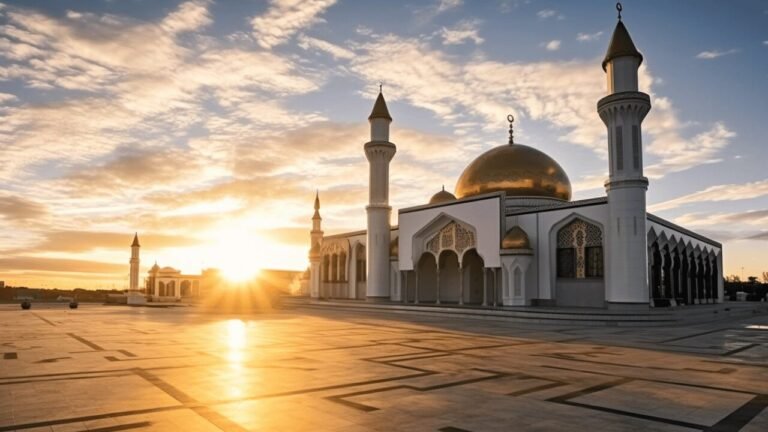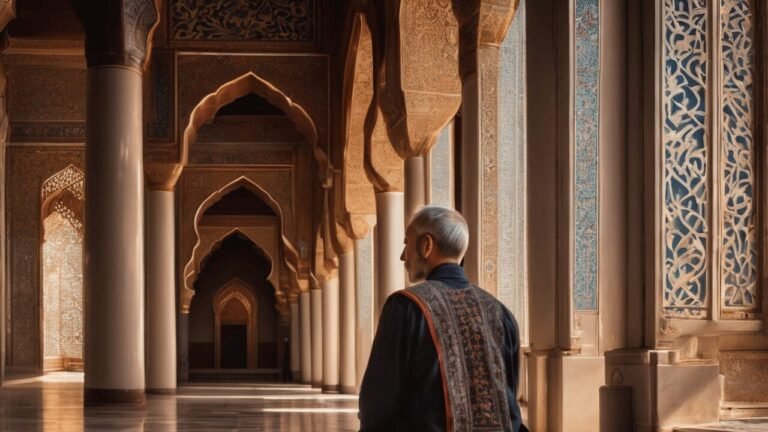The concept of the Hereafter is an integral part of Islam. It encompasses the idea of eternal life, the fear of God, the consequences of the evil soul, and the inevitability of death. Prophet Muhammad emphasized the importance of belief in the hereafter and provided guidance on attaining eternal bliss. Additionally, Islamic teachings shed light on the roles of men and women in the next world and the events of Judgment Day.
Key Takeaways
- Islam teaches the belief in the Hereafter, which includes eternal life and the inevitability of death.
- Prophet Muhammad provided guidance on attaining eternal bliss in the Hereafter.
- Islamic teachings highlight the roles of men and women in the next world.
- In Islam, Judgment Day holds individuals accountable for their actions on Earth.
- Believers strive for righteousness and good deeds to secure a place in Paradise.
Table of Contents
- The Significance of Good Deeds in Islam
- The Role of Death and Resurrection in Islam
- The Role of Prophet Muhammad in Understanding the Hereafter
- Islamic Teachings on the Hereafter for Believing Women
- The Day of Judgment: A Momentous Event in Islam
- The Rewards of Paradise in Islamic Theology
- The Punishment of Hell in Islam
- The Divine Justice in the Hereafter
- Conclusion
- FAQ
The Significance of Good Deeds in Islam
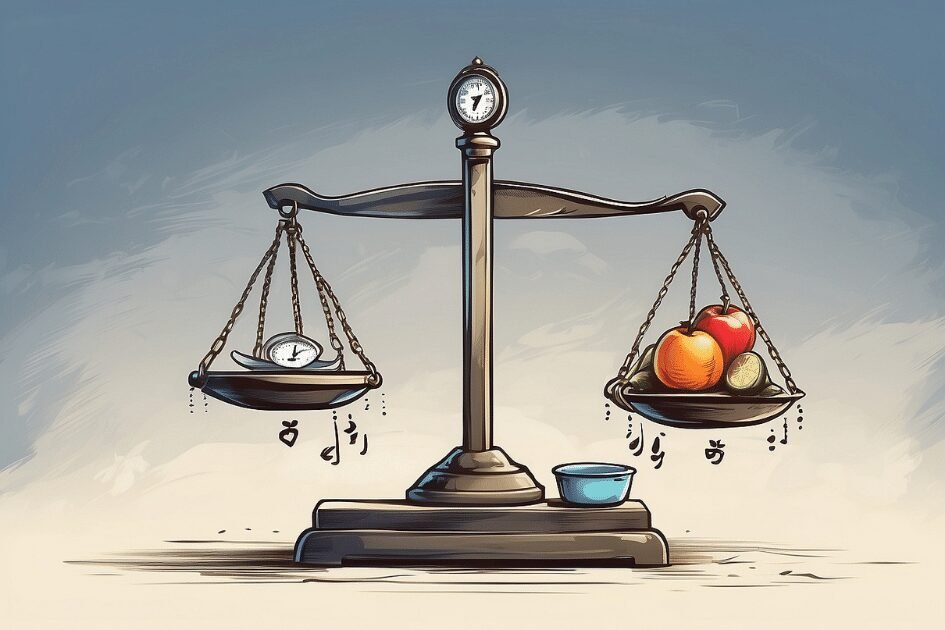
In Islam, the performance of good deeds holds great significance. Good deeds are seen as acts of worship that benefit the individual and society. They are a means of achieving a better present existence and attaining eternal bliss in the everlasting world of the Hereafter.
Islamic teachings emphasize the importance of good deeds to earn glad tidings and divine justice. The Quran mentions the rewards that await those who engage in acts of righteousness, such as entering Paradise, where rivers flow, and eternal happiness awaits.
Muslim scholars provide guidance on the types of good deeds that can lead to these rewards. Examples include charitable acts, kindness toward others, seeking knowledge, and actively participating in the community. By adhering to these teachings, individuals can strive for holiness and attain the eternal rewards promised in Islam.
The Benefits of Good Deeds in Islam

“Do not belittle any good deed, even if it is just smiling at your brother. Every good deed has its own weight and can bring you closer to Paradise.” – The Prophet Muhammad (peace be upon him)
Muslims perform good deeds to please God and positively impact the world. These acts of kindness and charity contribute to the overall welfare of society, promoting peace, justice, and harmony among individuals.
It is essential to note that in Islam, the motivation behind performing good deeds should be solely for the sake of God. The purity of intention is crucial, as it ensures sincerity and authentic engagement in acts of righteousness.
| Examples of Good Deeds in Islam | Benefits |
|---|---|
| Charitable Giving | Helps those in need and purifies wealth |
| Kindness and Compassion | Fosters harmonious relationships and strengthens communities |
| Seeking Knowledge | Enables personal growth and intellectual development |
| Spreading Peace and Justice | Contributes to a more equitable and inclusive society |
The Role of Death and Resurrection in Islam

Death and resurrection play a significant role in Islamic beliefs. Muslims understand that all human beings will one day taste death. This belief in the inevitability of death reminds individuals of the power and authority of God Almighty.
This world may seem like real life in Islam, but it is temporary. The actual, everlasting life is in the Hereafter. Even minor actions, like an atom’s weight of good or evil, will be held accountable on the Day of Resurrection. Muslims believe in the divine command that all humans will fall dead, and the entire world will witness events such as rivers flowing, people entering hell or Paradise, and the beginning of the next life.
Events on the Day of Resurrection
Numerous events will occur on the Day of Resurrection according to Islamic teachings. These events include rivers flowing, which symbolize the abundance and blessings of the Hereafter. The righteous believers will enter Paradise, where they will be rewarded with eternal bliss. On the other hand, those who have committed evil deeds may enter hell, where they will face punishment for their actions.
“And hasten to forgiveness from your Lord and a garden as wide as the heavens and earth, prepared for the righteous. Who spend [in the cause of Allah] during ease and hardship and who restrain anger and who pardon the people – and Allah loves the doers of good.” – Quran 3:133-134 (Surah Al ‘Imran)
Islam teaches that the Day of Resurrection is momentous, marking the transition from this temporary world to the everlasting Hereafter. Muslims believe in the divine justice that will prevail, with each individual held accountable for their beliefs and actions. Through a sincere belief in God Almighty and the performance of righteous deeds, believers hope to attain eternal bliss.
| Events on the Day of Resurrection | Description |
|---|---|
| Rivers Flowing | Symbolizes the abundance and blessings of the Hereafter |
| People Entering Hell or Paradise | Consequences for individuals’ actions in the present world |
The Role of Prophet Muhammad in Understanding the Hereafter
The teachings of Prophet Muhammad greatly influence the understanding of the Hereafter in Islam. Through his divine revelations and the Quranic description of the Hereafter, Prophet Muhammad provided valuable insights into the events of Judgment Day, the concept of divine justice, and the rewards for those who enter Paradise.
“The best among you are those with the best manners and character.” – Prophet Muhammad (peace be upon him)
Prophet Muhammad’s teachings emphasized the importance of righteousness and good deeds in attaining eternal bliss. He guided believers to Paradise, where flowing rivers and purified spouses await in the eternal abode. The Prophet’s role in understanding the Hereafter is crucial, as his guidance provides Muslims with the knowledge and inspiration to strive for a righteous life and secure their place in the next world.
Prophet Muhammad’s Teachings on Divine Justice
One of the key aspects of the Hereafter is the concept of divine justice, which is central to Islamic beliefs. Prophet Muhammad taught that God’s justice would prevail on Judgment Day, where everyone would be held accountable for their beliefs and actions.
- Those who have lived righteous lives and followed the teachings of Islam will be rewarded with eternal bliss in Paradise.
- Evil deeds will result in punishment.
This belief in divine justice reminds believers to lead virtuous lives and strive for righteousness. Prophet Muhammad’s teachings on divine justice provide Muslims with a clear understanding of the consequences of their actions in the Hereafter.
Rewards and Punishments in the Hereafter
| Rewards | Punishments |
|---|---|
| Enter Paradise | Face Punishment |
| Experience eternal bliss | Endure fiery torment |
| Enjoy flowing rivers | Face the consequences of evil deeds |
| Be united with purified spouses | Experience the loss of blessings |
The teachings of Prophet Muhammad provide a comprehensive understanding of the Hereafter in Islam. His guidance on the concept of divine justice, the rewards of Paradise, flowing rivers, and purified spouses inspire believers to lead righteous lives and strive for eternal bliss in the Hereafter.
Islamic Teachings on the Hereafter for Believing Women

Islamic teachings on the Hereafter encompass both men and women, providing guidance on attaining eternal bliss and avoiding fiery torment. Believing women play a vital role in the pursuit of righteousness and are encouraged to perform good deeds for the sake of God. Women can secure a place in the eternal abode by striving for piety and demonstrating their faith through righteous actions.
Islam emphasizes the importance of seeking eternal bliss, which applies equally to both men and women. Believing women are encouraged to dedicate themselves to worship, charity, and kindness, knowing their efforts will not go unnoticed. They are reminded that their actions are not only for their own benefit but also for the sake of God and the greater good of society.
“The reward of deeds depends upon the intentions, and every person will get the reward according to what he has intended.” – Prophet Muhammad.
Islam recognizes women’s immense potential to contribute to society’s betterment and emphasizes their ability to shape their own eternal destiny. Believing women are encouraged to cultivate a strong relationship with God, seeking His guidance and mercy daily. By remaining committed to their faith and piety, they can take comfort in the promise of eternal happiness in the afterlife.
The Day of Judgment: A Momentous Event in Islam
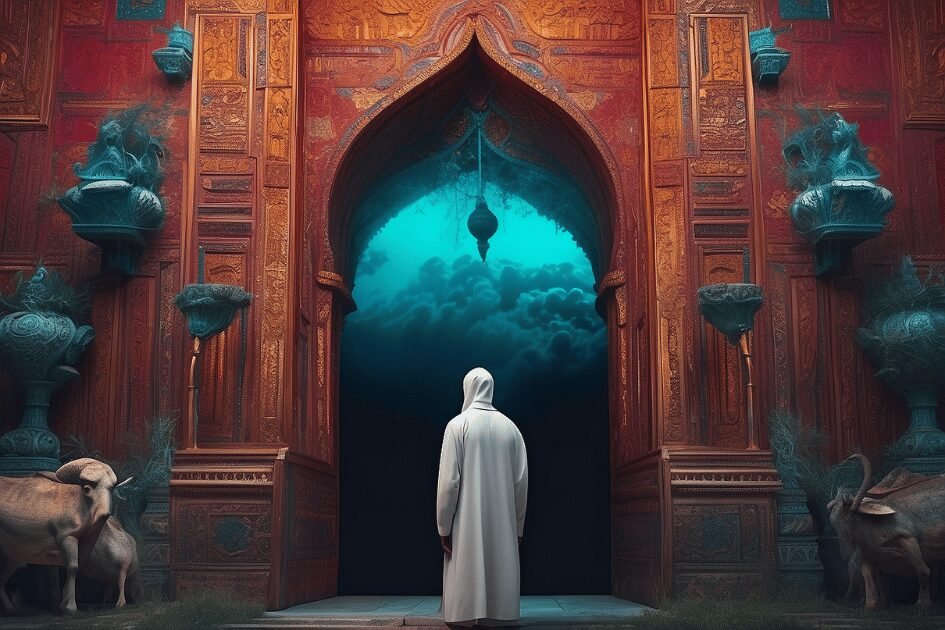
The Day of Judgment, also known as the Day of Resurrection, holds immense significance in Islamic theology. It marks the transition from this world to the next, where all individuals will be held accountable for their actions in the next world. Muslims believe this day is appointed by God and will be a time of reckoning and divine justice.
Islamic teachings highlight the importance and seriousness of the Day of Judgment. Muslim scholars have shared their understanding and explanations of the events that will occur today. On the Day of Judgment, all those who have passed away will be brought back to life, and divine justice will be revealed to the world.
On the Day of Judgment, believers strive to enter Paradise, the ultimate reward for leading a righteous life. Islamic teachings guide individuals in attaining this eternal bliss and seeking God’s mercy and forgiveness. It is believed that those who have performed exemplary deeds followed the teachings of Islam, and upheld their faith will be granted entry into Paradise, where they will experience eternal joy and tranquility.
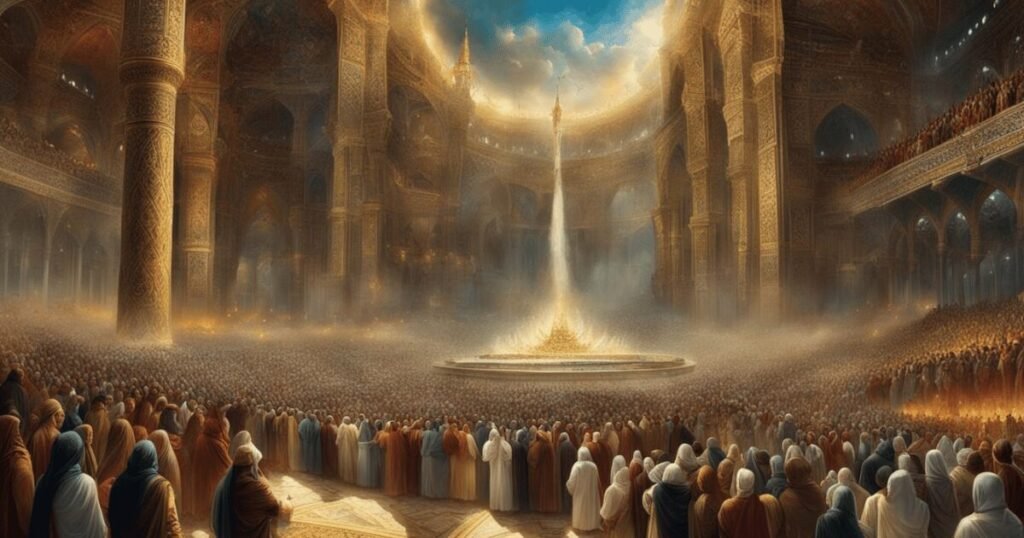
The Concept of Divine Justice
A key aspect of the Day of Judgment is the concept of divine justice. Islam teaches that God is just and fair, and He will judge each individual according to their beliefs, actions, and intentions. It is believed that on this day, every good deed and every act of injustice or wrongdoing will be accounted for. The justice system will ensure that each person is fairly rewarded or punished.
Muslims find solace and reassurance in knowing divine justice will prevail in the Hereafter. The Day of Judgment serves as a reminder to strive for righteousness, seek God’s pleasure, and lead a life that follows Islamic principles. It is a call to reflect upon one’s actions, seek forgiveness for wrongdoing, and constantly strive for self-improvement and spiritual growth.
The Rewards of Paradise in Islamic Theology

Paradise in Islamic theology holds immense rewards for believers who have lived a righteous life by the teachings of Islam. It is a place of eternal bliss, where believers will find everlasting peace and fulfillment. The imagery of flowing rivers, an eternal home, and palm trees evoke a sense of tranquility and beauty that can only be found in Paradise.
In Islamic theology, Paradise is the ultimate reward for the believers who have faith and do good deeds. It culminates in a life of devotion to God and a testament to divine mercy and justice. The concept of Paradise motivates believers to strive for righteousness and seek eternal bliss in the Hereafter.
“Verily, the dwellers of Paradise, that Day, will be busy in joyful things. They and their spouses will be in shady groves, reclining on thrones. They will have all kinds of fruits and meat to enjoy. They will have whatever they desire. Peace will be their greeting from a Merciful Lord.” – Quran, Surah Ya-Sin (36:55-58)
The Rewards of Paradise
The rewards of Paradise are multifaceted and go beyond the realm of material possessions. It is a spiritual abode where believers experience ultimate joy and contentment. It is a place free from pain, suffering, and the hardships of the worldly life. Instead, believers will find solace and rejuvenation in the everlasting bliss of Paradise.
| Rewards of Paradise | Benefits |
|---|---|
| Eternal Bliss | Believers will experience eternal happiness and contentment. |
| Flowing Rivers | Paradise will be adorned with rivers of pure and sweet water. |
| Eternal Home | Believers will have a permanent and peaceful dwelling in paradise. |
| Palm Trees | The beauty of paradise will be enhanced by lush palm trees. |
The rewards of Paradise in Islamic theology serve as a source of hope and motivation for believers. It is a reminder that the trials and tribulations of this world are temporary, and the eternal abode of Paradise awaits those who remain steadfast in their faith and good deeds.
The Punishment of Hell in Islam

In Islam, the concept of hell plays a significant role in the understanding of the Hereafter. It is commonly believed that this place serves as punishment for individuals who have committed evil deeds during their lifetime. Hell is often described as a fiery torment, emphasizing the severity of the consequences of straying from the path of righteousness.
The concept of hell serves as a deterrent for believers, reminding them of the importance of leading a virtuous life and seeking forgiveness for their sins. Islam emphasizes that every action has consequences, and individuals will be held accountable for their choices on the Day of Judgment. This belief instills a sense of responsibility and encourages believers to strive for moral excellence.
“The Fire is your dwelling-place wherein you abide forever unless Allah wills otherwise.” – Quran 6:128
Islamic teachings regarding hell serve as a reminder of evil’s consequences and the importance of seeking guidance and righteousness. It is a testament to the divine justice in Islam, where every deed, good or bad, will be accounted for in the Hereafter.
The Severity of Hell
The severity of hell in Islamic belief is emphasized to emphasize the gravity of its punishment. It is described as a place of unimaginable torment and suffering, where evildoers will experience intense pain and regret for their actions. The descriptions serve as a reminder to stay on the path of righteousness and prioritize virtuous deeds.
The Mercy of God
Islam emphasizes mercy and forgiveness in addition to punishment for sins. Repentance can lead to salvation. It is a testament to the balanced worldview in Islam, where divine justice and mercy coexist.
The Divine Justice in the Hereafter
In Islam, the concept of divine justice is fundamental to understanding the Hereafter. It is believed that on Judgment Day, God will judge every individual according to their beliefs, actions, and intentions. This divine justice ensures that each person will be held accountable for their deeds and face appropriate consequences. Whether reward or punishment, the ultimate aim is establishing justice and fairness in the Hereafter.
Justice is central to Islamic teachings, emphasizing the importance of faith and good deeds. Believers are encouraged to firmly believe in God’s divine justice and strive to perform righteous acts for His sake. This includes acts of worship, charity, and kindness towards others. Through sincere belief and virtuous actions, individuals hope to attain the mercy and forgiveness of God and secure their place in the eternal abode.
“Verily, God does not do injustice, even as much as an atom’s weight; while if there is a good deed, He multiplies it and gives from Himself a great reward.” – Quran 4:40
The Role of Belief and Faith

Belief in divine justice is closely linked to the concept of belief and faith in Islam. Through faith, individuals recognize God’s authority and wisdom and trust in His ultimate judgment. The belief in divine justice reassures believers, knowing that all their efforts and struggles will be accounted for and rewarded accordingly in the Hereafter.
Islam teaches that true faith is not merely a verbal declaration but is manifested through actions. The combination of belief and righteous deeds leads to salvation and eternal bliss.
“Whoever does righteousness, whether male or female, while he is a believer – We will surely cause him to live a good life, and We will surely give them their reward [in the Hereafter] according to the best of what they used to do” – Quran 16:97
It is through the combination of belief, faith, and good deeds that individuals seek divine justice in the Hereafter. Islam encourages believers to have confidence in the fairness and wisdom of God’s judgment, knowing that no act of righteousness will go unrewarded and no injustice will go unpunished.
To learn more, visit our article on the 6 Pillars of Iman.
Conclusion
The concept of the Hereafter in Islam provides believers with a deep understanding of eternal life. Islam offers guidance on leading a virtuous life, seeking truth, and finding inner peace. By focusing on the Hereafter, believers can navigate this present world while preparing for a life of everlasting bliss and fulfillment.
Islam emphasizes the importance of seeking the truth and striving for righteousness for the sake of God. It teaches that the path to eternal life lies in embracing the teachings of Islam and performing good deeds. Through the belief in the Hereafter, individuals can find solace, knowing that their actions and intentions will be justly judged by God on Judgment Day.
By embodying the values of truth, peace, and justice, believers can strive for eternal life in the Hereafter. Islam teaches that mankind has the opportunity to attain everlasting peace and fulfillment by following the path set forth by Prophet Muhammad and the teachings of the Quran. By embracing the concept of the Hereafter, individuals can live their lives with purpose and strive for a future of eternal bliss.
FAQ
What is the concept of the Hereafter in Islam?
The concept of the Hereafter in Islam encompasses the idea of eternal life, the fear of God, the consequences of the evil soul, and the inevitability of death.
How important is the belief in the Hereafter in Islam?
The belief in the Hereafter is integral to Islam, and Prophet Muhammad emphasized its importance and provided guidance on how to attain eternal bliss.
What role do good deeds play in Islam?
Good deeds are seen as acts of worship in Islam, benefiting both the individual and society. They are a means of achieving a better present existence and attaining eternal bliss in the Hereafter.
What role does death and resurrection play in Islamic beliefs?
Muslims believe that all human beings will one day taste death and that true, everlasting life is in the Hereafter. Even minor actions will be held accountable on the Day of Resurrection.
What is the role of Prophet Muhammad in understanding the Hereafter?
Prophet Muhammad received divine revelations through the Quranic description, providing insights into the events of Judgment Day, divine justice, and the rewards for entering Paradise.
How do Islamic teachings on the Hereafter apply to believing women?
Islamic teachings guide believing women on how to attain eternal bliss and avoid punishment. The importance of righteousness and performing good deeds for the sake of God is emphasized.
What is the significance of the Day of Judgment in Islam?
The Day of Judgment is a momentous event in Islam, where all individuals will be held accountable for their actions. Muslim scholars offer interpretations and insights into the events and divine justice that will prevail on this significant day.
What are the rewards of Paradise in Islamic theology?
Paradise is a place of eternal bliss, with flowing rivers and an eternal home. The imagery of palm trees and other descriptions highlight the beauty and tranquility believers can expect in their eternal abode.
What is the punishment of hell in Islam?
Hell is depicted as a fiery torment that awaits those who have committed evil deeds. Believing in the consequences of our actions helps us avoid doing wrong and seek forgiveness.
What is the concept of divine justice in the Hereafter?
Islam teaches that God will judge all individuals on Judgment Day according to their beliefs, actions, and intentions. Believers strive to have faith and perform righteous deeds for the sake of God, believing in the ultimate divine justice that will prevail in the Hereafter.


